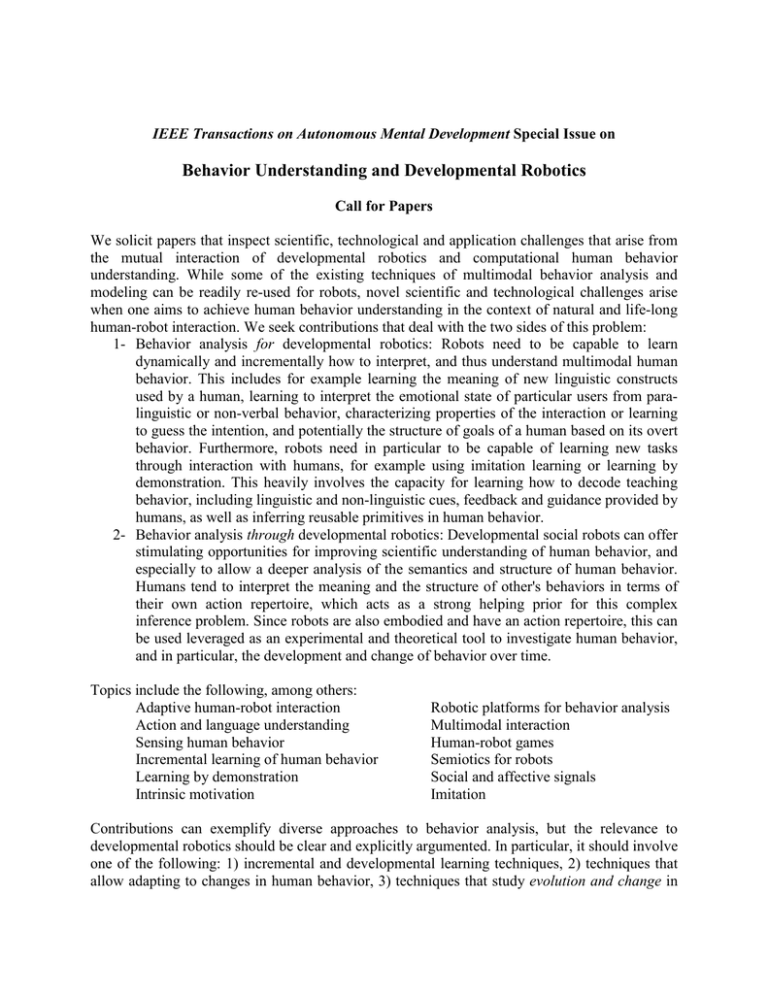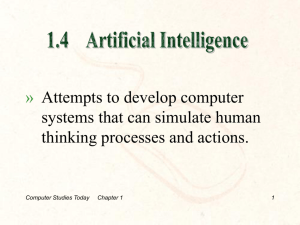Behavior Understanding and Developmental Robotics
advertisement

IEEE Transactions on Autonomous Mental Development Special Issue on Behavior Understanding and Developmental Robotics Call for Papers We solicit papers that inspect scientific, technological and application challenges that arise from the mutual interaction of developmental robotics and computational human behavior understanding. While some of the existing techniques of multimodal behavior analysis and modeling can be readily re-used for robots, novel scientific and technological challenges arise when one aims to achieve human behavior understanding in the context of natural and life-long human-robot interaction. We seek contributions that deal with the two sides of this problem: 1- Behavior analysis for developmental robotics: Robots need to be capable to learn dynamically and incrementally how to interpret, and thus understand multimodal human behavior. This includes for example learning the meaning of new linguistic constructs used by a human, learning to interpret the emotional state of particular users from paralinguistic or non-verbal behavior, characterizing properties of the interaction or learning to guess the intention, and potentially the structure of goals of a human based on its overt behavior. Furthermore, robots need in particular to be capable of learning new tasks through interaction with humans, for example using imitation learning or learning by demonstration. This heavily involves the capacity for learning how to decode teaching behavior, including linguistic and non-linguistic cues, feedback and guidance provided by humans, as well as inferring reusable primitives in human behavior. 2- Behavior analysis through developmental robotics: Developmental social robots can offer stimulating opportunities for improving scientific understanding of human behavior, and especially to allow a deeper analysis of the semantics and structure of human behavior. Humans tend to interpret the meaning and the structure of other's behaviors in terms of their own action repertoire, which acts as a strong helping prior for this complex inference problem. Since robots are also embodied and have an action repertoire, this can be used leveraged as an experimental and theoretical tool to investigate human behavior, and in particular, the development and change of behavior over time. Topics include the following, among others: Adaptive human-robot interaction Action and language understanding Sensing human behavior Incremental learning of human behavior Learning by demonstration Intrinsic motivation Robotic platforms for behavior analysis Multimodal interaction Human-robot games Semiotics for robots Social and affective signals Imitation Contributions can exemplify diverse approaches to behavior analysis, but the relevance to developmental robotics should be clear and explicitly argumented. In particular, it should involve one of the following: 1) incremental and developmental learning techniques, 2) techniques that allow adapting to changes in human behavior, 3) techniques that study evolution and change in human behavior. Interested parties are encouraged to contact the editors with questions about the suitability of a manuscript. Editors: Albert Ali Salah, Boğaziçi University, salah@boun.edu.tr Pierre-Yves Oudeyer, INRIA, pierre-yves.oudeyer@inria.fr Çetin Meriçli, Carnegie Mellon University, cetin@cmu.edu Javier Ruiz-del-Solar, Universidad de Chile, jruizd@ing.uchile.cl Three kinds of submissions are possible: Regular papers, up to 15 double column pages, should describe new empirical findings that utilize innovative methodological and/or analytic techniques. Correspondence papers, up to 8 double column pages, can focus on a limited set of relevant aspects in depth. Survey papers, describing classes of behavior analysis approaches in developmental robotics. Before submitting a survey paper, the authors should contact the guest editors. Instructions for authors: http://cis.ieee.org/ieee-transactions-on-autonomous-mental-development.html We are accepting submissions through Manuscript Central at http://mc.manuscriptcentral.com/tamd-ieee (please select “Human Behavior Understanding” as the submission type) When submitting your manuscript, please also cc it to the editors. Timeline: 30 April 2013: 15 July 2013: 15 October 2013: 20 October 2013: December 2013: Deadline for paper submission Notification of the first round of review results Final version Electronic publication Printed publication
